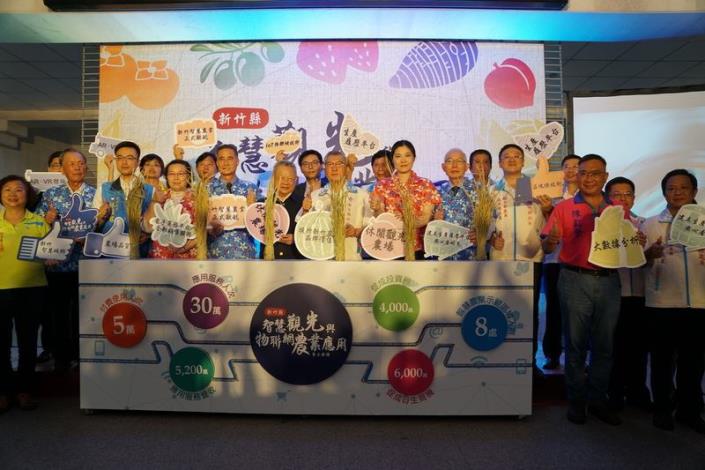
Awarded the Top 7 Intelligent Community two years ago, Hsinchu County Government has been developing an international AI research park and has got ahead of other cities/counties in Taiwan in terms of applying the blockchain technology to produce traceability. On the morning of September 14, Hsinchu County Magistrate Chiu Ching-chun, Chief Secretary of Industrial Development Bureau, MOEA, Chen Pei-li, President of FHNet Hunag Nan-ren, and President of Communications Industry Alliance Weng Pu-shan announced the start of the program called "Intelligent Tourism and IoT Agriculture" at the lobby of Hsinchu County Hall. Magistrate Chiu believes the program will transform old patterns of agriculture and tourism and bring new commercial opportunities.
By design, a blockchain is resistant to modification, which makes it a safe, reliable, and verifiable record. Magistrate Chiu shows that the application of the blockchain technology allows people to know the entire production process of each agricultural product. With the availability of the information, consumers can purchase agricultural products without worries, and farmers can make more profits.
Director of General Development Department Chen Guan-yi indicates that the county government will cooperate with FHNet, e-go, and Funcom Supermarket to develop intelligent tourism and intelligent agriculture through emerging technologies, such as IoT, big data, AR, and VR. By integrating agriculture and tourism with new technologies, both industries can be upgraded and thus generate more income for Hsinchu County.
In terms of agriculture, the county government will utilize the IoT technology and develop an environmental control system depending on farmers' needs. The system will allow farmers to monitor soil, air, water quality, fertilizer, and pest threat so that less manpower is needed throughout the entire process and the quality, volume of production, and production cycle can be accurately controlled.
As for production and sales, the county government is to establish an online agricultural product sales platform, an intelligent business service system, and the produce traceability service featuring the blockchain technology. Besides, the county government will help match local farmers with proper sales channels. Through contract farming, farmers' profits can be assured and increased, and it is hoped that young people can come back to Hsinchu County because of the change of these farming practices from breeding, planting, processing to selling. This brand new sales pattern will facilitate the analysis of the entire farming industry and customers' needs and bring greater benefits. In the future, those high-quality agricultural products can also be picked up at the convenience store in Hsinchu County Hall.
On the other hand, as people in Taiwan pay more and more attention to leisure activities, the county government plans to integrate IoT farming into tourist farms and cooperate with tour operators to establish an electronic ticket package system. Based on sharing economy, local and foreign visitors alike are allowed to purchase e-tickets and experience AR and VR services.
At the press conference on September, not only did the government announce the kickoff of the program, but it also encouraged farmers to introduce the IoT technology to their farming practices. Director Chen Guan-yi says that there will be a few locations where interested farmers can apply to join, and a series of illustration meetings will be held later on. Those farmers who get involved in this program will produce traceable agricultural products and sell them through various channels. This pattern will create a win-win situation not only by yielding greater profits for the farmers but also by allowing the government to ensure food security from production to consumption.